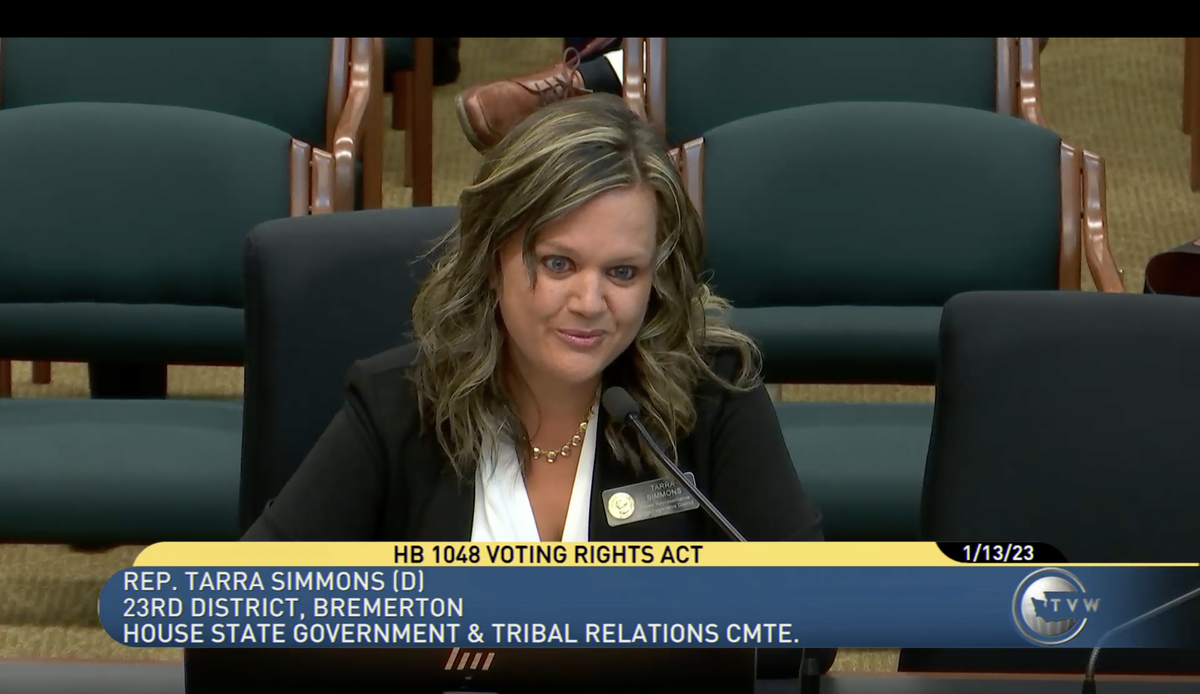Bill seeks to increase registration and voting accessibility in Washington’s jails

OLYMPIA – A formerly incarcerated legislator is the sponsor of a bill that seeks to make voting easier for people in jail in Washington.
People convicted of a felony and currently serving time are ineligible to vote, but legislation passed in 2022 made it legal for them to re-register after they are released from prison. Many of those incarcerated in county jails are awaiting trial, and since they have yet to be convicted, still retain their right to vote. But there are many barriers that stand in the way of eligible incarcerated voters and the ballot box. Obstacles include access to information and a lack of advocacy and education.
The new bill from Rep. Tarra Simmons, D-Bremerton, would require county auditors to work with jail administration to implement a voting plan for each county jail. The plans would include details on assisting incarcerated people with registration, receiving and completing their ballot. The bill also would require jails to collect and document voting-related complaints and requests.
“It’s a blessing and a curse that I’m the first formerly incarcerated legislator in our nation and that I have the opportunity to come before you and always raise up people that have often been forgotten, people in our jails and prisons,” Simmons said.
Simmons is believed to be the first United States state legislator elected with a past felony conviction, the Washington Post reported.
The bill would require county auditors and jail personnel to designate a voting plan for incarcerated people, but Spokane County Auditor Vicky Dalton has already been implementing improvements for voting in Spokane County detention facilities.
Dalton asked the board of commissioners last September to accept their part of a $2.5 million grant from the Legislature to improve voting access in Spokane jails. While the board of commissioners at the time declined the grant, Dalton still worked with the county’s remaining budget to improve the jails’ inmate tracking software ahead of the 2022 general election.
Working with jail administration and local activist groups, Dalton implemented a system in which incarcerated people could request voter registration forms and ballots from the jails’ commissary, a similar process to requesting a candy bar.
“It becomes crucial those few weeks right before Election Day, when ballots are being cast, to try to make sure that on a daily basis that we’re able to serve whatever the population is,” Dalton said, pointing to the often transient nature of inmates in these facilities.
During the period of the 2022 general election, inmates in Spokane County requested 59 registration forms, of which 18 were completed and returned. Nine inmates requested ballots, and the auditor’s office received 11 completed ballots. Dalton attributed the two additional ballots to outside sources, saying the auditor’s office received requests from people outside the jail on behalf of someone incarcerated.
Opponents of this bill expressed concerns that education outlined by the voting plans could be politically biased and requested that the bill put emphasis on a nonpartisan body being responsible for such education.
Additionally, opponents said the aspect of the bill requiring data collection would add more work to the jail administration system.
“In my experience working in jails and prisons for two decades, I can speak to the resource expenditure in response to inmate complaints alone,” said Jeneen Breshears of the Conservative Ladies of Washington. “This will put an administrative burden on an already overstressed system.”
Proponents of this bill emphasized the disproportionate effect this issue has on people of color, saying that barriers to voting in jail acts as a tool for voter suppression.
As of December, there were 757 people held in Spokane County detention services. Of this, 124 (16%) were Black. Black people make up 2.1% of Spokane County’s population, according to estimations by the U.S. Census Bureau.
Proponents also cited the importance of civil participation for incarcerated people, saying providing an explicit avenue towards voting could improve recidivism rates.
Julian Saucier, who has been incarcerated, visited jails in Kitsap County to register inmates to vote. He said the response from inmates was overwhelming, and he ran out of voter registration forms after the first tier in the jail. Two other tiers gave him and other volunteers a round of applause.
“You could see in peoples’ eyes just to feel part of something, to be connected,” Saucier said. “I think that is underrated, just how important every aspect of being a citizen is when you’re trying to return (to your community).”
The bill was originally heard by the House Committee on State Government and Tribal Relations on January 13. It is scheduled for executive session on Wednesday, where committee members will vote on moving it to the House floor.
Editor’s note: This article was changed on Jan. 23, 2023 to clarify that Simmons is believed to be the first state legislator in the United States elected with a past felony conviction.